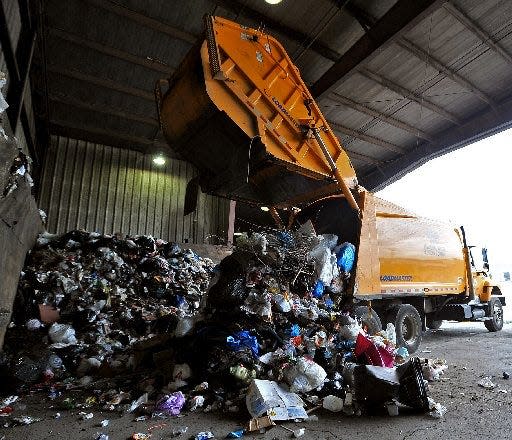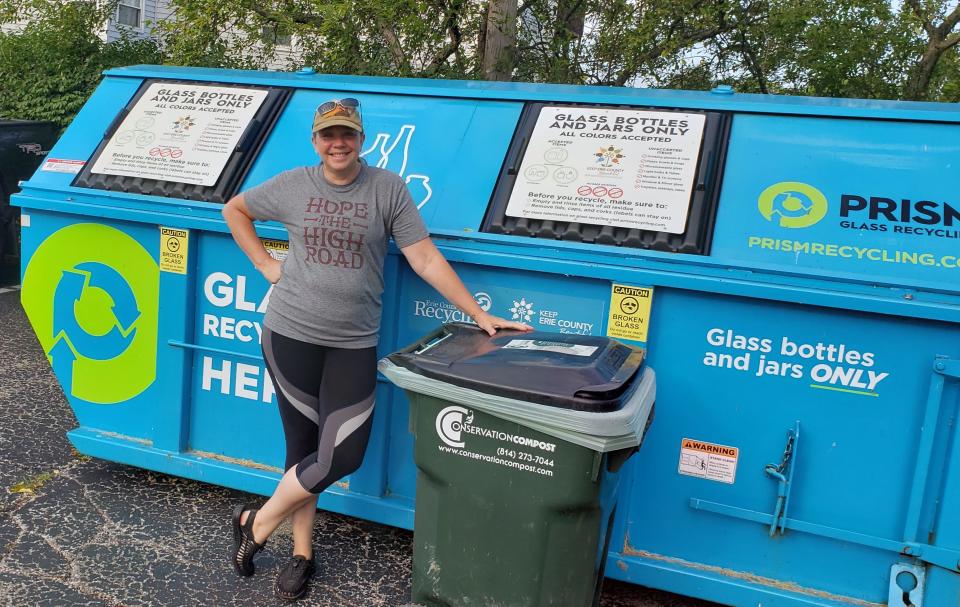Erie City Council approves garbage, sewer fee hikes, key proposal in 2023 budget
City of Erie residents: get ready to pay more for sewer and garbage service in 2023.
Erie City Council, at its regular meeting on Wednesday morning, voted 6-1 to approve refuse and sewer rate hikes, a key component of Mayor Joe Schember’s $98.2 million general fund budget proposal for 2023.
The vote took place after a presentation to council members by a Penn State-Behrend professor and several of her students, who conducted a study on the feasibility of glass/food compost recycling in Erie. The study recommends that city officials consider implementing such a program.
The proposed sewer rate increase represents roughly $1.4 million in revenue and would increase the average city residential customer's sewer rates from roughly $306 a year to $343, or by roughly 12%, according to Lisa Gomersall, the city’s acting finance director.

The proposed garbage rate increase, Gomersall has said, represents roughly $412,000 in revenue and would increase an average residential customer's yearly fees by 4.3%, to $273 from the current $261.
The sewer rate increase is the city’s first since 2019. Garbage rates were last increased in 2020.
City of Erie budget:New stormwater fee approved as City Council gets 2023 budget plan, with trash/sewer fee hikes
Council President Liz Allen and colleagues Mel Witherspoon, Maurice Troop, Jasmine Flores, Chuck Nelson and Michael Keys voted for the increases.
Councilman Ed Brzezinski was the lone “no” vote on the increases. He sought to table both increases, but could not garner enough support among his colleagues on the seven-member panel to delay a vote.
Council is now poised to approve the 2023 budget at its Dec. 21 meeting.
Fee hike debate
During budget deliberations in late 2020 and late 2021, a City Council majority and Schember’s administration agreed to remove proposed garbage and sewer rate increases from the city's 2021 and 2022 budgets.

2022 city budget:Erie City Council scraps garbage/sewer fee hikes
However, City Council signed off on the increases this time largely because several members of the panel said regular increases cannot be delayed any longer.
“This is us playing catch-up,” Flores said.
Brzezinski opposed the increases, saying he wanted to explore additional cuts before passing garbage/sewer hikes.
“There’s a lot of money in that budget that could be moved around,” Brzezinski said.

Allen disagreed.
“Cuts in the budget are not going to offset this (revenue),” Allen said.
Schember has said he hopes that in the future City Council will support raising garbage/sewer fees incrementally, by 2% to 4% each year, to avoid yearly debate over larger fee hikes.
The 2023 budget proposal does not include a property tax increase, but it suggests using $3.3 million in funds set aside from the Erie Water Works lease prepayment deal of 2020, which provided the city roughly $95 million to stabilize its finances.
Schember said that money is needed to balance the budget, in large part, because of rising employee salaries and other expenses.
Penn State-Behrend study: glass/compost recycling in Erie
In other business Wednesday, a Penn-State Behrend professor and a group of her students told City Council members that recycling glass and food compost makes both environmental and financial sense for the city of Erie.
Sherri “Sam” Mason, an associate research professor and director of sustainability at Penn State-Behrend, and a group of her students came to that conclusion after exploring whether the city should look to launch a separate collection/recycling effort for glass and food-related compost as part of its refuse operation.
Glass/food compost recycling in Erie:College professor probing feasibility
Mason and her students presented a draft report of their findings to City Council during the panel’s Wednesday morning meeting.
During June and July, Mason and four student interns collected more than 1,800 pounds of glass and food compost in two west Erie neighborhoods as part of their research; the study was compiled for a sustainability class that Mason teaches.

“We estimate that diverting food waste from landfilled materials could save the City of Erie over $450,000 annually, while the diversion of glass recycling would save (another $150,000) yielding a total savings of over $600,000” the Behrend report states.
“Based on lessons learned in other communities,” the report states, “we recommend the City of Erie to move to a containerized, mechanized curbside waste and recycling collection process, which would act to save additional monies, as well as improving employee safety, increasing recycling participation rates, and decreasing urban litter."
Rules of recycling in the city of Erie: Plastics, papers, metals and other items
The savings would be realized by reducing the city’s tipping fees, according to the report. Tipping fees are paid by anyone who disposes of waste at a landfill.
City officials paid more than $1.3 million in tipping fees in 2021, according to Chuck Zysk, the city’s public works director.
Further, the report states that the glass/food compost recycling program could keep up to 14,000 tons of glass/food compost out of landfills.
“Especially on the East Coast, we’re really running out of landfill space,” Mason told City Council members. “We really need to, as a collective whole (and) as a nation, be rethinking what goes into landfills.”
Launching such a program would cost the city up to $2.4 million, the report estimates, but the glass/compost recycling program “would yield a net return on investment within 7 years” for the city.
Allen said the issue is worth exploring, and she thanked Mason and the Behrend students for their work.
“We have a lot of expertise at our universities,” said Allen, who added that the study underscores “that we can find other ways to use our young people to do this kind of deep dive into particular issues.”
Mason said a final report will be submitted to City Council later this month.
Contact Kevin Flowers at kflowers@timesnews.com. Follow him on Twitter at @ETNflowers.
This article originally appeared on Erie Times-News: Erie City Council signs off on sewer, garbage rate hikes for 2023

